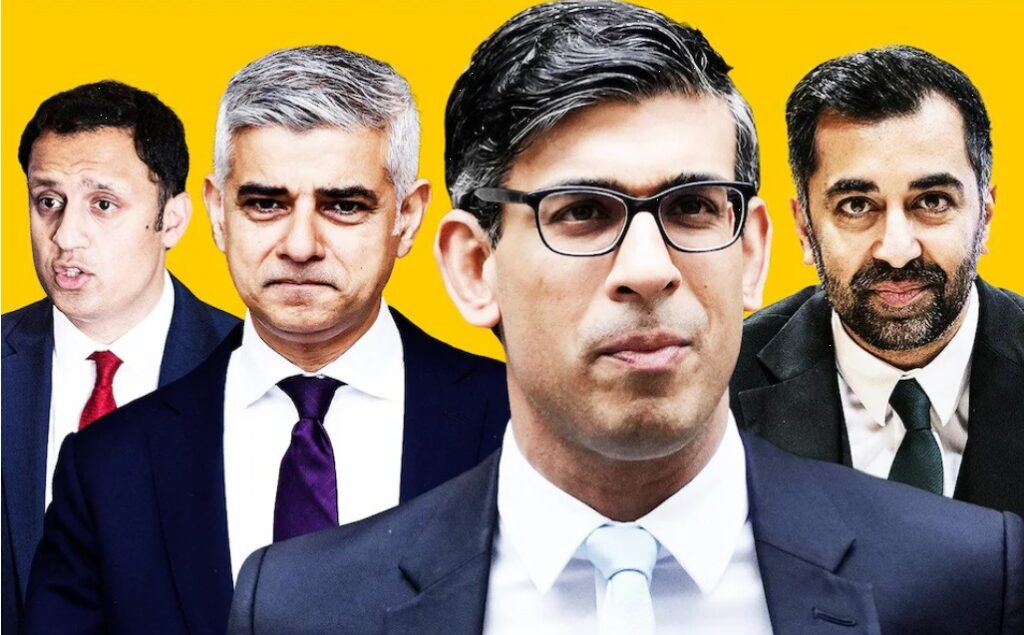Introduction
Over the past few decades, the British Asian community has emerged as a significant political force in the UK. With increasing political engagement, especially in local and national politics, they have shown a remarkable ability to organise and mobilise their communities towards active participation in the political process. However, there is a stark contrast with the evolution of Afro-Caribbean counterparts, who encountered some obstacles in the political arena. These developments have raised important questions about social mobility, social and political capital, immigration, citizenship, multiculturalism, diversity, race, ethnicity, identity, and leadership.

How Did British Asians Rise in the UK Political Arena?
Humza Yousaf’s recent appointment as the leader of the Scottish National Party is a testament to the remarkable social mobility that has taken place in modern Britain. Yousaf, whose grandparents migrated to Glasgow in the 1960s, initially struggled with the English language but has now ascended to one of the highest political positions in Scotland. Yousaf’s success story of other British Asians who have become increasingly politically engaged and formed strong community networks, mobilising their communities to participate in local and national politics.
The Prime Minister, the Mayor of London, and the Scottish Labour leader are also children of first-generation Asian migrants born in the UK. These leaders’ parents came to Britain to provide their children with a better life and worked hard to provide them with every advantage. All four leaders had parents who emphasised the value of education, leading to three attending private schools. Anas Sarwar and Humza Yousaf even went to the same school in Glasgow.
These successful leaders represent a significant shift in race relations in the UK in 2023, as British-Asian leaders now occupy four of the most senior roles across the political spectrum.
Evaluating the Variations in Social Mobility & Success of British Asians Compared to African Caribbean Communities
Kwasi Kwarteng’s short-lived tenure as Britain’s first Black Chancellor is unlikely to be viewed positively in history. The mini-budget he presented had a catastrophic effect on the economy, leading to the devaluation of the pound and an increase in interest rates. Despite his early exit, the moment was still significant in terms of representation as it marked a time when white men, a powerful symbol of progress in diversity and inclusion in British politics, held no of the four great state offices. Labour MP David Lammy has spoken extensively about racial discrimination in UK politics over the past few years, highlighting the lack of diversity. Moreover, Lammy has also discussed instances of racism and prejudice that he has faced personally, both within and outside of politics, calling for greater representation and recognition of Black and minority ethnic communities in the political system.

Business Insider interviewed Black members of the UK Parliament to gain insight into their experiences as Black individuals in British politics and the impact of the Black Lives Matter movement. Labour MP Clive Lewis spoke about being told that “we can’t have a Black MP” during his selection process in Norwich and the insidious nature of structural racism within the Labour Party. MP David Lammy has always experienced racism as an MP, but the frequency has increased with social media, maintaining that this issue results from people retreating into closed communities.
In this pursuit, several variables hinder the access and prosperity of Black people to UK politics, with the most prominent instances being their socio-economic background and educational circumstances.
Stereotypes and racial epithets significantly impact everyday interactions for Asian and Black minorities, as they can either exclude or privilege certain groups and confer, deny, or approve capital rewards. However, the negative connotations associated with stereotypes and idiosyncratic perceptions of Black people put them at a natural disadvantage. In contrast, Asian stereotypes often focus on employable characteristics such as intelligence, academic striving, introversion, and rule compliance. Black stereotypes tend to cluster around crime, militancy, aggression, bitterness, and athleticism. Such negative labels are reinforced by news outlets and media rhetoric, which underpin hegemonic normalcies and contribute to the marginalisation of Black people. This marginalisation leads to a downward trajectory of social opportunities, educational outcomes, and occupational prospects for Black people. While Asian British politicians have been able to embrace their ethnic and cultural identity while also asserting their Britishness, Black British politicians have often been forced to choose between their British identity and their ethnic identity.
Although ethnic minority groups in the UK continue to face challenges and disparities in various areas, studies have shown that the Asian and Indian community stands out as some of the wealthiest and most economically affluent. The Wire reported that a staggering 25% of Indian households belong to the wealthiest income bracket, surpassing even White British households, of which only 24% belong to this bracket. Furthermore, individuals from the Indian community are paid 16.5% more than their white counterparts, indicating a significant economic advantage.
The reasons behind this success are multifaceted and can be attributed to a combination of factors, including high levels of education, a strong work ethic, and a focus on entrepreneurship. Many Indian and Asian immigrants to the UK have come with high education and skill levels, which has enabled them to secure high-paying jobs or start successful businesses. Additionally, Indian culture strongly emphasises hard work and family values, which have helped foster a community that values education and professional success.
According to the UK Government, the most deprived 10% of neighbourhoods in the UK indicate that Black individuals are more likely to reside in these areas. Specifically, the data reveals that Black people have the highest representation, at 16.3%, in neighbourhoods considered most deprived concerning crime. Additionally, they are more likely to reside in neighbourhoods with high barriers to accessing housing and services, representing 31.2%.
Recent data from the UK Parliament indicates that Black students are more likely to drop out of higher education than any other ethnic group and are least likely to achieve a first or upper-second-class degree. This underscores the presence of institutional and structural racism in higher education that sustains disparate outcomes predicated on race. Black students frequently encounter distinctive obstacles, including financial instability, psychological distress, and instances of prejudice and exclusion, which can substantially influence their educational achievements.
Upon further examination, it has become apparent that Black Caribbean students consistently face a significantly higher risk of exclusion than their White peers. The Guardian emphasises that in some local authorities, the risk of exclusion for Black Caribbean children can be as high as five times that of White children. Therefore, it is essential to recognise intersectionality, which refers to the recognition that everyone has unique experiences of oppression and discrimination.
These hindrances are compounded by the lack of appropriate assistance and direction for Black students in higher education, who are more likely to have lower academic performance and elevated attrition rates. Black students may experience feelings of isolation or a lack of support in academic settings that do not align with their cultural backgrounds or personal experiences. This can lead to difficulties in accessing and utilising support services crucial to their academic success.
Lessons from Asian Politicians for the Black Community
For many years, multiculturalism has been a key policy objective in the United Kingdom, but its implementation has been inconsistent. Asian communities have used their cultural and religious identity to gain a place in the political arena. In contrast, Black communities have frequently faced discrimination and exclusion, with Black politicians being consistently targeted and discriminated against. Hence, there are several critical lessons that Black communities can draw from the advent of Asian politicians.
Undoubtedly, their dedication towards education and strong work ethic represent the success of the Asian politicians who have climbed the ranks in UK politics. These politicians’ parents instilled in them the value of education and directed them towards prestigious educational institutions. On top of this, their higher levels of integration are equally important, as the communities of these politicians encouraged them to preserve their cultural heritage while integrating into British society. Despite the challenges they faced, the perseverance of Asian politicians highlights the importance of resilience in the face of obstacles on the journey to success.
However, it is paramount to recognise that Black communities have been persistently disadvantaged by harmful stereotypes and more precarious socio-economic circumstances, which significantly hindered their ascent in British Politics.

Impact & Legacy Youth Leadership Program (ILYLP)
Aiming to address the pervasive challenges encountered by the young Black community, the Impact & Legacy Youth Leadership Program (ILYLP) is an innovative and empowering initiative designed to develop socially conscious and active young Black leaders. Through this comprehensive training and mentoring program, they aim to equip 12–18-year-olds with the tools, skills, strategies and blueprint necessary to succeed in their lives.
As an accessible and innovative avenue for the young Black generation, this program provides a unique opportunity for young Black people to develop educational, leadership and entrepreneurial skills to help them excel personally and professionally. With a focus on promoting diversity and inclusivity, ILYLP is committed to empowering the next generation of Black leaders and creating a lasting impact on communities worldwide. Join the ILYLP community today and participate in a movement shaping the future of Black leadership.
As an accessible and innovative avenue for the young Black generation, this program provides a unique opportunity for young Black people to develop educational, leadership and entrepreneurial skills to help them excel personally and professionally. With a focus on promoting diversity and inclusivity, ILYLP is committed to empowering the next generation of Black leaders and creating a lasting impact on communities worldwide. Join the ILYLP community today and participate in a movement shaping the future of Black leadership.

